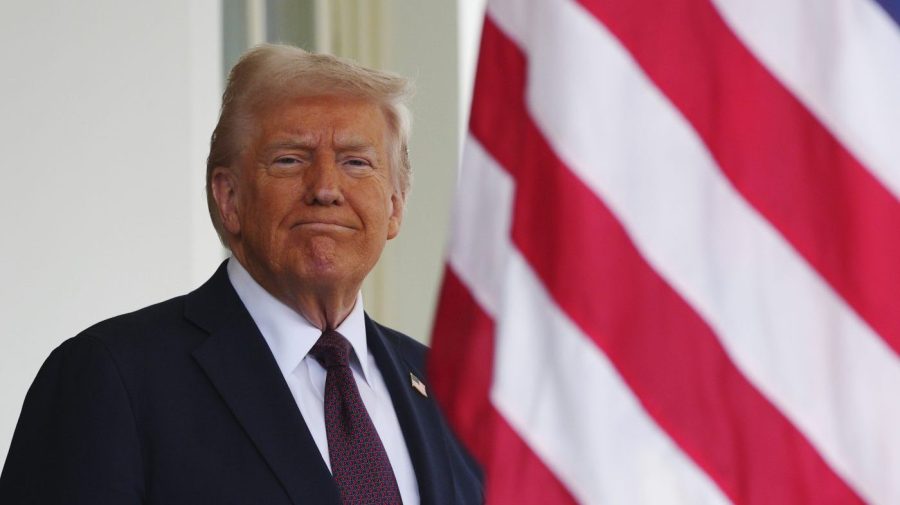
Since President Trump’s inauguration, the White House has issued an almost ceaseless flurry of executive orders and actions directly opposed to the language and intent of the Constitution. Despite these unconstitutional orders, the posturing by the Trump administration has simply been, “What are you going to do about it?”
On Feb. 15, Trump posted on X a quote usually attributed to Napoleon Bonaparte: “He who saves his Country does not violate any Law.”
Clearly, Trump has forgotten that he is a U.S. president, not a self-appointed authoritarian emperor of France.
The idea that a leader can be immune to laws simply because they believe they are “saving” their country is un-American. But this is coming from the first president ever to be convicted of a felony, who received no penalty or punishment thereof. It should come as no surprise that he sees himself as above the law.
Anyone who agrees with Trump’s statement should review the Declaration of Independence, where the very first grievance levied against the King of England was that “he has refused his Assent to Laws, the most wholesome and necessary for the public good.”
King George III and Napoleon had this behavior in common. Indeed, what binds all dictatorships and authoritarian leaders are the cries of patriotism and righteousness that supposedly back their actions. They demand unquestioning acceptance of their actions and see all attempts to thwart them as treasonous.
Sound familiar? It should, because it is happening right before the American public’s eyes.
In late January, U.S. District Judge John McConnell Jr. told the White House that it must abide by the preliminary injunction ordered by the court to halt its nationwide funding freeze. This led to Elon Musk retaliating by doxxing the judge’s daughter as well as calling for the impeachment of federal judges who are checking the power of DOGE and the White House. Republicans in Congress are filing and preparing to file articles of impeachment against these judges.
The legal and political implications of this cannot be understated. Judicial impeachments are exceedingly rare — only 15 federal judges have ever been impeached in American history, with just eight convicted by the Senate. Impeachable offenses for federal judges are treason, bribery and other high crimes. If Congress impeaches Judge McConnell and the others, then Republicans will set the precedent that honoring constitutionally mandated checks and balances by going against the executive is equal to treason.
And anyone who claims Trump and Musk are just fighting judicial activism doesn’t understand what judicial activism is. It isn’t asserting the power of the judiciary to ensure legality and that things are done through proper channels. That is the very crux of our system.
The framers deliberately crafted and put into place the system of checks and balances for our three branches of government to provide sufficient power to govern while ensuring the protection of the liberties of the governed. These safeguards make sure that the public has recourse against a president, Congress or judiciary that believes they are above the law — or in this case, a president who considers himself a king.
When the vice president is claiming that “judges aren’t allowed to control the executive’s legitimate power,” there is a clear disconnect between what the Constitution says and what the Trump administration wants its power to be. Over 200 years of legal precedent, going back to Marbury v. Madison, prescribes judicial review of actions by the president and Congress. No judge is limiting the “legitimate power” of the executive or legislative branch by striking down actions that violate the law.
While the understanding of checks and balances is Civics 101, a recent survey exposed that 17 percent of Americans seem to think that the president should be able to disregard Supreme Court decisions altogether — an alarmingly high number. And while most Americans say it would be “too risky” to give presidents, including Trump, more power, this is a highly partisan issue, with only 39 percent of Republicans agreeing that providing Trump with more power would be problematic.
As a society, we must come together to ensure American democracy stays true to its foundational principles despite the opposing rhetoric of our president and his team. When the Constitution is treated more like an obstacle than a guiding foundation, when checks and balances are conflated with treason and when power is consolidated under the guise of efficiency, we are no longer speaking about governance — we are talking about tyranny.
If we allow the executive branch to trample upon the foundations that define our democracy, then we are complicit in its unraveling. The safeguards as prescribed in the Constitution are not a suggestion, they are the very bedrock of our liberty. It now falls on us, we the people, to stand up and defend it.
Addison J. Hosner is the chief operating officer of Young Voices, based in Washington, D.C., and is a licensed Florida and D.C. attorney.











